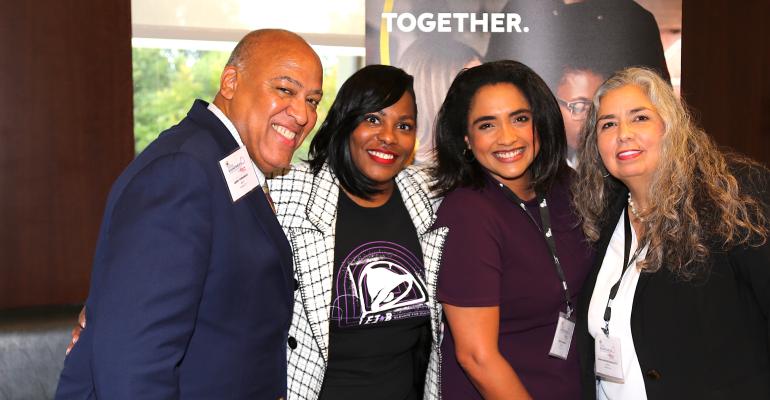Diversity, equity and inclusion success requires top-down corporate leadership, leaders in the foodservice business said Tuesday during a panel at The Cheesecake Factory headquarters.
Panelists on the “State of the DEI Industry Panel” at the Multicultural Foodservice & Hospitality Alliance Roundtable at The Cheesecake Factory headquarters in Calabasas, Calif., included: moderator Gerry Fernandez, MFHA founder and president; Katrina "KT" Thornton, Taco Bell’s chief equity, inclusion and belonging officer; Angela Simonian, US Foods’ market vice president; and Maria Martinez Gugliotti, Sodexo’s senior area general manager.
“Sometimes the conversation bubbles from the bottom,” Simonian said. “But what we're doing at US Foods is we're intentionally making sure we're changing the leadership top-down.”
Simonian, the first African-American woman in the market vice president position, added: “Executive level leaders, they have to be able to understand the reason why.”
Simonian added that diverse applicants for positions are also important.
Thornton of Taco Bell, a division of Louisville, Ky.-based Yum Brands Inc., noted that her company’s CEO has made diversity a strategic goal for 2023.
“It becomes a part of the strategic operating model and not an H.R. talking point,” she said, “It shifts the dynamic.”
Guglotti, a Native American Navajo Hispanic who was the first female to run the Marine Corps depot, said diversity is important to any organization, but it also must be based on talent.
“I'm in forward motion and I'm going to continue that forward motion because it's super important for the women that I work with to understand that it's not about the color it's about our talent we are extremely talented people,” she said. “And we have a lot to say a lot to say."
Simonian said younger job applicants remain very aware of how a companies approaches diversity.
“I have a 20-year-old son who is part of the LGBTQ-plus community,” she said. “So when my son was identifying … I called my company out. I was like: Let's see about this ‘bring your whole self to work’; I want to see how you are going to accept me.”
Simonian added that “There are young people who are members of this community, and they're watching.” They are watching such things as whether someone is using a pronoun in their signature.
Her son researched where he wanted to work because he wanted to find a company that was inclusive of his experience and of him, she said.
“They want to work for a company where they will be included,” Simonian said. “And I want to work for a company where I know my child will be included."
Thornton said she doesn’t have to be a part of a historically disadvantaged community to be an advocate.
“If you're leading with equity,” she said, “you are looking at systems not the person in the seat leading the system. And if we look at how we going to change our systems and make sure that we're inclusive that is a tremendous amount of courage. Because you're admitting in one sense you haven't been necessarily inclusive. So programs that look at underrepresented talent — how to bring more Black talent, Latina LGBTQ-plus those with disabilities — can have a stop-and-go motion.”
At Taco Bell, she said, leaders have started to talk about equity, inclusion and belonging as an evolution. “I have to be an advocate for fairness and action,” Thornton said.
Thornton said she was fan of the Deloitte’s Maturity Model, and Taco Bell spent a month and half doing a talent audit, which led to an overhaul of talent acquisition and how the company sources and interviews applicants for jobs. With a pilot launched a month ago, she said, the company has already increased the number of Black and Latino applicants
MFHA plans similar roundtables Aug. 1 in the Boston area with Inspire Brands and Nov. 9 in Chicago with McDonald’s Corp.
Contact Ron Ruggless at [email protected]
Follow him on Twitter: @RonRuggless





